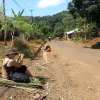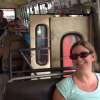Old posts from my very first travel website!
We've just witnessed the lifecycle of coffee, from tree, to bean, harvesting, drying, washing, roasting, brewing, to adding the milk and sugar (if desired), to of course... drinking.
Here in the Bolaven Highlands of Laos, the city of Paksong, almost every residence has some coffee beans drying on a tarp in front of their home. Our guide on the trek, T'hao, owns a nice coffee garden with mostly Robusta plants but a few Arabica and Liberica thrown in for fun. When harvesters come from the surrounding areas, they camp here for one-two months while harvesting, and fish/hunt/gather for food. They get paid around US$40/month. Pulling only the red beans (leaving the green for next month) they go from tree to tree and either pull down the top branches with rope or use a ladder.
The beans must be dried around 3-4 weeks if left in the fruit, or 1-2 weeks if not (washed). Probably a better flavor when dried in the fruit, but who has the time?
Major coffee companies then purchase these dried beans for roasting. Lucky for us, a Dutch expat here named 'Mr. Koffi' runs a small shop offering fresh coffee tastings and a Wok Roasting workshop...
So we learned how to roast the coffee beans in a wok on a propane stove (takes about 20 minutes). After tasting the results, we must say the coffee is quite good, very smooth, not needing milk nor sugar.
We'll bring back some roasted beans so you all can taste!
Samsung Galaxy Buds Pro 2 2022
These are wonderful noise cancelling ear buds. They have lots of great features and of course they are from a quality brand (sorry Apple folks) ;)
Shop This my recommended gear, not an ad #affiliatelink








